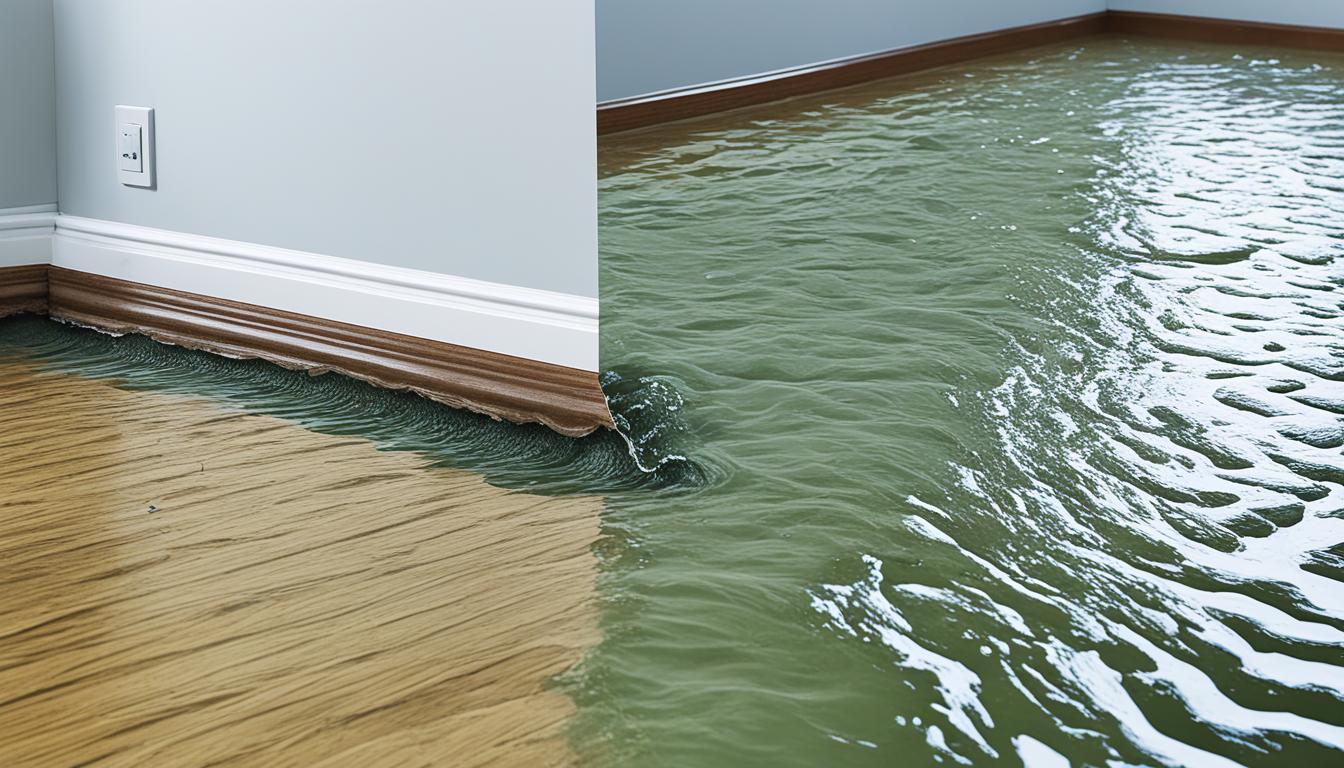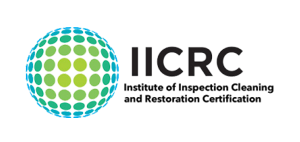Water damage can wreak havoc on your home, causing extensive and costly repairs. It is crucial to understand the different types of water damage that can occur and take preventive measures to protect your property. In this section, we will explore common types of water damage, such as leaks and floods, and discuss their impacts. We will also provide essential prevention steps to help you safeguard your home against water damage.
Key Takeaways:
- Water damage can occur in various forms, including leaks and floods.
- Leaks are a common type of water damage and can be caused by plumbing issues, roof problems, and appliance malfunctions.
- Floods, often caused by natural disasters or indoor incidents, can result in significant damage to your home.
- Water damage can lead to structural issues, mold growth, and potential health hazards.
- Taking preventive measures and ensuring adequate insurance coverage are essential in protecting your home.
Leaks: A Common Form of Water Damage
Water damage can occur in various ways, but one common form that homeowners often face is leaks. Leaks can be a result of plumbing issues, roof damage, or malfunctioning appliances, and they can lead to extensive water damage if not addressed promptly.
Types of Leaks
There are different types of leaks that can occur in your home:
- Plumbing leaks: These can happen in pipes, faucets, or toilets, and they are often caused by corrosion, high water pressure, or worn-out seals.
- Roof leaks: Roof leaks can be caused by damaged shingles, cracked flashings, or clogged gutters.
- Appliance leaks: Leaks from appliances like washing machines, dishwashers, or water heaters can occur due to faulty connections or worn-out hoses.
Causes of Leaks
Understanding the causes of leaks is essential in preventing water damage. Common causes of leaks include:
- Aging or deteriorating plumbing systems
- Harsh weather conditions
- Poor installation
- Inadequate maintenance
Signs of Leaks
Being able to recognize the signs of leaks early on is crucial in preventing extensive water damage. Look out for the following signs:
- Dripping sounds
- Water stains or discoloration on walls or ceilings
- Musty or moldy odors
- Unexplained increases in water bills
- Pooling water or dampness in unexpected areas
Identifying these signs and taking prompt action can help mitigate the damage and save you from costly repairs.
Remember, addressing leaks as soon as possible is crucial in preventing extensive water damage to your home. Regular inspection and maintenance can help identify leaks early on and minimize the potential for water damage.
Floods: A Damaging Water Event
Floods are severe water events that can cause significant damage to your home. Understanding the different types of floods and their potential impact on your property is essential for effective preparation and mitigation. Let’s explore the various types of floods and how they can occur.
Natural Disasters and Floods
Natural disasters such as hurricanes or heavy rainfall can lead to catastrophic flooding. These events can overwhelm the natural drainage systems and cause rivers, lakes, and other bodies of water to overflow, resulting in widespread flooding. The immense volume of water can put your home at risk and cause extensive damage to its structure, interior, and belongings.
Indoor Flooding
Flooding can also occur indoors, often as a result of plumbing issues or appliance malfunction. A burst pipe, a faulty water heater, or a malfunctioning washing machine can cause water to fill your home, damaging walls, floors, and valuable possessions. Indoor flooding can happen suddenly and without warning, making it crucial to address any leaks or plumbing problems promptly.
Flash Flooding
Flash flooding is another type of flooding that poses significant risks. It occurs when heavy rainfall overwhelms the capacity of drainage systems, causing water to accumulate rapidly in low-lying areas. Flash floods can happen suddenly, leaving little time for preparation, and can be particularly dangerous due to their swift and unpredictable nature.
Now that we’ve explored the different types of floods, it’s important to understand the steps you can take to protect your home from flood damage. By implementing preventive measures and having a solid emergency plan in place, you can safeguard your property and minimize the potential impacts of flooding.
| Type of Flood | Cause | Potential Damage |
|---|---|---|
| Natural Disasters | Hurricanes, heavy rainfall | Structural damage, interior damage, loss of belongings |
| Indoor Flooding | Plumbing issues, appliance malfunction | Damage to walls, floors, and possessions |
| Flash Flooding | Heavy rainfall, overwhelmed drainage systems | Rapid accumulation of water in low-lying areas |
Remember, being prepared and proactive is key to reducing the impact of floods on your home. Stay informed about the risk of floods in your area, maintain your property’s drainage systems, and consider investing in flood insurance to protect your home against potential water damage.
Impact of Water Damage on Your Home
Water damage can have numerous adverse effects on your home, causing significant harm and posing potential risks. In this section, we will explore the impacts of water damage, including structural damage, mold growth, health hazards, and the potential decrease in property value.
Structural Damage
One of the most concerning impacts of water damage is the potential for structural damage to your home. When water infiltrates the foundation, walls, or ceilings, it can weaken the structural integrity of the building. Over time, this can lead to cracks, sagging, or even collapse, jeopardizing the safety and stability of your property.
Mold Growth
Another serious consequence of water damage is the growth of mold. Excess moisture provides an ideal environment for mold to thrive and multiply rapidly. Mold can spread throughout your home, causing not only unsightly stains and odors but also posing health risks. Exposure to mold spores can lead to respiratory problems, allergies, and other health issues, particularly for individuals with pre-existing conditions.
Health Hazards
Water damage can create various health hazards in your home. Apart from mold growth, stagnant water can become a breeding ground for bacteria, viruses, and parasites. These contaminants can contaminate the air and water, potentially causing infections, gastrointestinal issues, and other health problems. It is crucial to address water damage promptly to mitigate the health risks associated with it.
Property Value
Water damage can significantly impact the value of your property. Potential buyers are wary of homes with a history of water damage due to the potential for hidden structural issues, mold, and ongoing maintenance problems. The presence of water damage can decrease the value of your property and make it challenging to sell or negotiate a reasonable price.
As you can see, water damage can have far-reaching consequences for your home. From structural damage to mold growth, health hazards, and a decrease in property value, it is crucial to address water damage promptly and effectively. In the next section, we will discuss essential prevention steps to help you safeguard your home against water damage.
Conclusion
Understanding the different types of water damage is crucial for homeowners like you. By recognizing the risks associated with leaks and floods, you can proactively take preventive measures to minimize damage to your property. Regular maintenance, prompt repairs, and having adequate insurance coverage are key factors in protecting your home from potential water damage.
By staying vigilant and addressing potential water issues promptly, you can save yourself from costly repairs in the long run. Remember, being proactive in identifying and resolving problems can ensure the long-term integrity of your home.
Take the necessary steps to safeguard your property. Regularly check for any signs of leaks or potential flooding risks, and address them promptly. Consider investing in proper drainage systems, sump pumps, and backup generators to minimize the impact of flooding. Additionally, ensure your insurance coverage includes comprehensive water damage protection.
By implementing these preventive measures, you can protect your home, your investment, and ensure a safe environment for you and your loved ones. Preserve the integrity of your property and enjoy peace of mind knowing that you have taken the necessary steps to mitigate the risks of water damage.
FAQ
What are the common types of water damage?
The common types of water damage include leaks and floods.
How can leaks impact my property?
Leaks can cause structural damage, promote mold growth, and decrease the value of your home.
What are the different types of leaks?
There are various types of leaks, including plumbing leaks, roof leaks, and appliance leaks.
What are the causes of leaks?
Leaks can be caused by aging pipes, faulty plumbing, roof damage, or malfunctioning appliances.
What are the signs of a leak?
Signs of a leak may include water stains, dampness, musty odors, or an increase in water bills.
Why are floods considered damaging water events?
Floods can lead to extensive property damage, including structural damage, mold growth, and health hazards.
What are the different types of floods?
There are different types of floods, such as those caused by natural disasters like hurricanes and heavy rainfall.
What is indoor flooding?
Indoor flooding refers to water damage that occurs within a building, often caused by plumbing issues or appliance malfunctions.
What is flash flooding?
Flash flooding is a sudden and rapid flooding event that can occur due to heavy rainfall or storms.
How does water damage impact my home?
Water damage can lead to structural damage, promote mold growth, and decrease the value of your property.
What are the risks of mold growth following water damage?
Mold growth can cause health issues, such as allergies, respiratory problems, and asthma, and may require costly remediation.
How can water damage affect the value of my property?
Extensive water damage can decrease the value of your home and make it less attractive to potential buyers.







